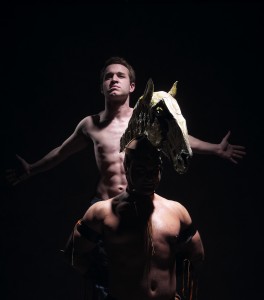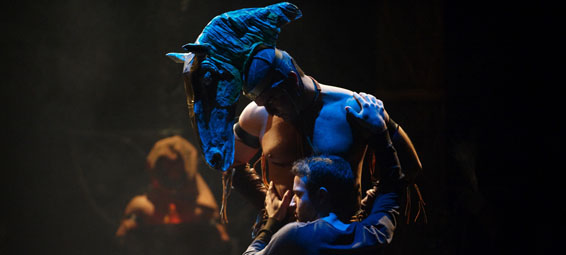Bare-chested broncs strut on stage and don horse-head hats. It’s at this point you realize that this Equus is a horse of a different color. Director Bruce R. Coleman has traded Chippendales for Clydesdales in Uptown Players’ offering of Peter Shaffer’s classic play at the Kalita Humphreys Theatre.
On a Stonehenge-y assortment of symbol encrusted styro-faux stone pillars and texture-painted rehearsal blocks designed by Coleman and beautifully lit by Jason Foster, a very upset Dr. Richard Dysart (Rick Espaillat) narrates a sort of clinical confession about a 16-year-old patient, Alan Strang (Max Swarner), who blinded some horses with a metal pick. Having argued for him to get treatment instead of prison, Magistrate (Carolyn Wickwire) convinces him to treat the boy. A cavalcade of characters’ accounts march through in dovetailed scene-ettes. The mother (Mary-Margaret Pyeatt) and father (Dan Morrow) appear and give half-truths, as any good minor character on Law and Order must in order to fill up the hour. At first, Alan proves a punk worthy of Dysart’s whine answering only in television jingles. But by trick and by trade the Dr. begins to unwind the mind and unravel the unconscious.
The inventive way in which the early exposition scenes interlace trap the actors into playing them casually. The concept is cool, but the info isn’t. This breeds a sort of dissonance, like not allowing an acrobat his bow after every trick. The actors have to fight the thrill of the theatricality and end up toning the character’s experience down as well. So, for the first section of the play we get people walking in and out without an idea where they are or an opinion about what they are relating. What should be an inventive way to deliver exposition Scrubs-like, ends up sentencing the audience and actors alike to doldrums instead of delight.
The real movement of the play should be the dangerous descent of Dysart. He must cure Alan of his wild religious horse fetish while he is plainly envious of the unbridled (Get it?) passion it displays. But time hasn’t been kind to this play. The crime of blinding horses was so disturbing in 1973 that the audience had to wonder about Dysart’s sanity from the outset. Who could possibly see something worth saving in a boy who would commit such a heinous act? But in our post-Columbine world, the shock value loses its power. We should feel repelled and intrigued along with Dysart – like Clarice Starling many years later seemingly risking it all when she talks to the limitless evil of Hannibal Lector. Where Dysart’s quest was once almost a psychotic break, now we have a whiny mid-life crisis.

It wouldn’t do to talk ofwithout referencing the original production. The success of the show owes much to the spare set juxtaposed with the grand theatricality of actors on stilts with horse headdresses. The play is a psychologist’s memory/exploration and the horses work as ever-present man-beast symbols. In fact, they and the entire cast never left the stage in that iteration. Joined by a portion of the audience, the crowd sat onstage jury-like. In the later scenes, the juxtaposition of those nude and not created tension. Framed as a descent into a psychologist’s mind, it played out like an autopsy in front of a gallery of students: detached grotesquery. Without this tension, the nudity of the Uptown Players’ evening, felt indulgent and almost tawdry. There was no threat that Dysart would be overcome by the passions taking place here; it was a foregone conclusion. It was the raison de theatre.
That’s what’s wrong with this Frankie Goes to Horseywood approach: purely American excessiveness. At the beginning, there’s no room to root for the two main characters because there’s no dichotomy. Without proper British societal restraint, neither knows what they’re rebelling against and consequently can find no traction. We can’t sympathize with Espaillat’s Dysart. How can we hope for him to open up and find his passion when he begins with cathartic supplication? We can’t sympathize with Swarner’s Strang, even when his mother slaps him, because instead of an intriguing blend of meek and monster, he is simply mean. Perhaps, this is why the arrival of Jill Mason, Strang’s love interest played affectingly by Lee Jamison Wadley, begins to sort out the play. Wadley’s Jill is very sympathetic as a girl on a date with a lunatic. She functions chorus-like to Strang offering insight into his confused feelings and a human outlet to his drives. We hope for the best but fear for the worst – just as we should be feeling for Dysart about Strang at the outset. Wadley’s arrival crystallizes what’s been missing and not a moment too soon.
The second act plays out effectively. If you can get past the Beefcake Bonanza of the first act, the play is strong enough to withstand the production. In the end, we are left feeling for the mixed-up mini-monster Strang and soggy-souled Dysart and wondering about the war inside ourselves between our own Apollonian reason and Dionysian creativity. What bargains have we made to get along in this civilized society? When do we allow ourselves to run with the horses?






